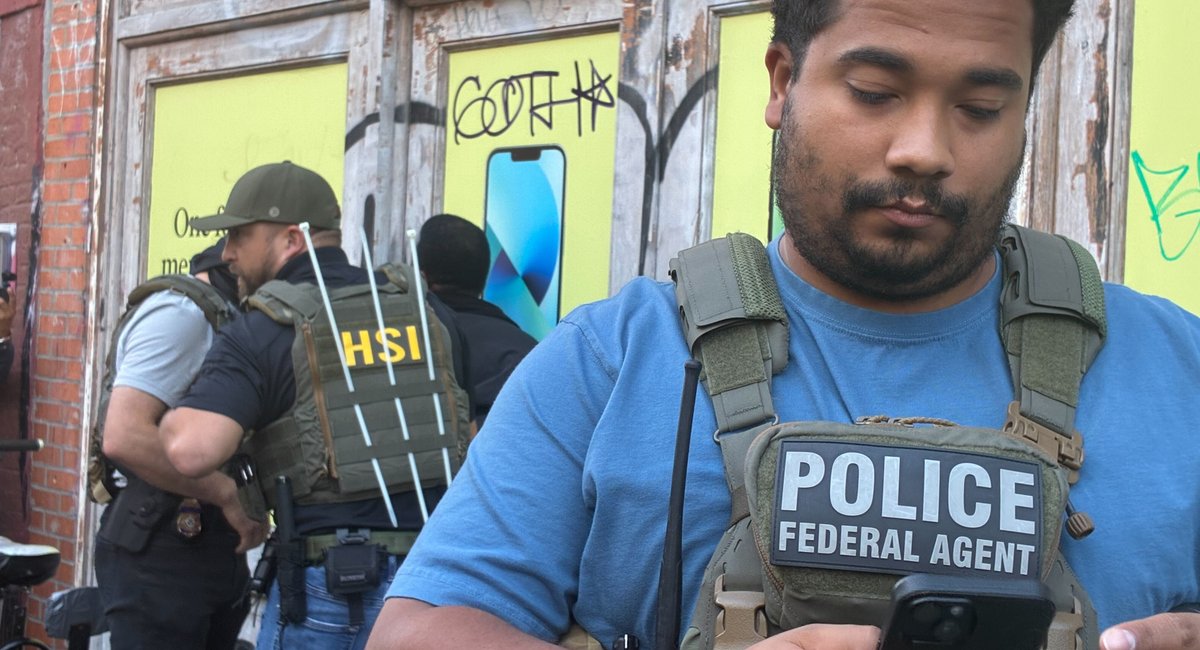The U.S. Immigration and Customs Enforcement raid targeting vendors of counterfeit merchandise in Chinatown is the latest law enforcement operation aimed at an underground economy that has persisted in Lower Manhattan for centuries.
In the 18th century, New Yorkers bought knockoff Chinese porcelain plates, lacquerware, custom portraits and paintings that were actually made in Europe and America, Rutgers University historian Jack Tchen said. In modern times, mayoral administrations since Rudy Giuliani have tried — and failed — to squash the sale of fake luxury items like faux Louis Vuitton handbags, bogus Rolex watches and Gucci glasses. The vendors were mostly Asian, but with the surge of migrants into the city beginning in 2022, African men began selling merchandise in the area in larger numbers.
“Chinatown really is just carrying on that tradition,” said Tchen, the director of the Clemente Price Institute at Rutgers University of Newark. “More than being this exotic, mysterious, fun place, or dangerous place to go to, it really is just carrying out the deep history of street life.”
New York City used to be full of massive open air markets, like Washington Market in Tribeca, where the World Trade Center is now, or Essex Street Market, with more vendors on the streets.
Private investigator Rob Holmes developed his own deep understanding of the counterfeit industry revolving around Canal Street. His dad, who was also a PI, was hired by high-end corporations to arrange raids on fake Rolex and handbag dealers. Holmes said he’s still hired to root out counterfeit watch dealers on Canal Street, but these days he also targets sellers of knockoff sneakers and jerseys.
In his dad’s day, the counterfeit merch would arrive in shipping containers at the Port of New York and New Jersey. Now, vendors buy the items wholesale on websites like dhgate.com. The fake goods are delivered to vendors’ doors, he said.
But despite the efforts of corporations, private investigators, the NYPD and federal agencies, Canal Street remains a hub for the sale of counterfeit goods.
The Department of Homeland Security portrayed the men it took into custody Tuesday as dangerous.
“NEW YORK’S CANAL STREET IS SAFER: 9 illegal aliens arrested have violent rap sheets including robbery, burglary, domestic violence, assaulting law enforcement, counterfeiting, drug trafficking, drug possession and forgery,” DHS tweeted this week, posting photos of the detained men, four of whom had previously been accused of counterfeiting.
ICE’s operation came two days after a contributor to Turning Point USA, which was founded by Charlie Kirk, tweeted a video from Canal Street.
“A huge group of African illegal immigrants are operating a black market on the corner of Broadway and Canal St in New York City,” Savanah Hernandez posted.
She wrote that while she was there, “the migrants began scrambling to pick up their items before fleeing into vehicles or on foot due to police presence in the area.”
Lawyers said ICE and other federal agencies used the counterfeit trade as a pretext for immigration enforcement aimed at low-level vendors.
“If their goal is to stop counterfeiting, what they need to do is to stop the importation, which is somewhere else — it’s not on Canal Street,” said attorney Stacey Van Malden, who has defended counterfeiting cases.
By Thursday afternoon, at least one vendor had returned, with several men selling handbags out of a large duffel bag.
Steven Pedro, a 40-year-old tourist from Dallas, Texas, had bought counterfeit Gucci and Louis Vuitton purses for his wife earlier in the week.
“The quality’s good. You could get a lot for your money,” he said, adding he couldn’t afford the real thing for his wife.
He’d returned to Canal Street just to check out the scene after the raid, and couldn’t believe how empty the streets were compared to earlier in the week.
“I was kind of actually kind of glad because you don’t have people like haggling with you get[ting] in your face,” Pedro said.
City Councilmember Shekar Krishnan said the vendors should be left alone. Mayor Eric Adams sought to crack down on unlicensed vendors in recent years.
“Canal Street has been a historic area for two reasons: One, it has been a hub for a lot of small business and commercial activity, and street vendors are our smallest businesses in New York City,” Krishnan said. “Street vendors are a part of the fabric of our city.”
But some legit stores weren’t so sympathetic. Kenneth Ma, a second-generation Chinese American who owns Chinatown Optical on Mott Street, did not like the bootleg sunglasses for sale on the street. Ma sells legitimate Ray Bans, Gucci and Prada glasses at his store, which has been around for 45 years.
“ It’s a really bad look … for Chinatown especially to be known as the counterfeit center of New York,” he said. “ We have some of the best services, haircuts, bubble tea, ramen noodles, wontons, dumplings, optical shops in the world. I want to be known for that, and not for counterfeiting.”
While Ma said he is glad to see most of the vendors hadn’t returned after the raid, he didn’t want to see it cleaned up in this way.
“It was really sad to see that, but just the frustration has been building up,” he said. “ I don’t want the federal raids. I want us locally to handle it.”

